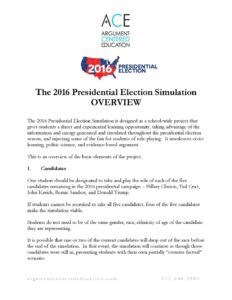Website (Re)Construction Project
One of Argument-Centered Education’s partner schools is implementing a highly innovative piece of curriculum in its U.S. History classes.
Called the Website (Re)Construction Project, it has students create argument-based web pages, on the course’s website, about an issue related to the Reconstruction period or the Civil War. Student web pages take a position on the debatable issue formulated specifically for the topic that they choose (or students can formulate, for instructor approval, their own commensurate debatable issue). Their designed webpages support that position with 2 – 4 evidence-based arguments. Evidence is required to come from a blend of primary and secondary sources, with weighting going to the primary. Each student’s webpages must also address and refute at least one strong counter-argument. Students are encouraged to use historical photographs, newspaper and personal accounts of the period, and other artifacts to create a visual theme on their webpages, one that “rhymes with” their argumentative position.
Organizing a Unit by Debatable Issues: ‘Number the Stars’ and a Curricular Organizer
Fundamental to coherently argumentalizing literacy curriculum is solving this puzzle: how will debatable issues or essential questions actually and effectively organize all aspects of a unit, including content delivery, discussion, performance tasks, and assessment. There are many means to building in this coherence to unit planning and implementation, of course. What’s important is to use tools that are applicable to the dimensions and resources specific to the unit and its curricular approach, but that also fulfill the generalized purpose of tying all elements of a unit, whether loosely or tightly, back into its driving arguable questions.
Simulating the 2016 Presidential Election
This argument-based project, the 2016 Presidential Election Simulation, is being offered to ACE partner high schools for implementation in May and June. It is designed as a school-wide project that gives students a direct and experiential learning opportunity, taking advantage of the information and energy generated and circulated throughout the presidential election season, and injecting some of the fun for students of role-playing. It interleaves civics learning, politic science, and evidence-based argument.
What follows is an overview of the basic elements of the project.
‘Simile-Evidence-Reasoning’ — An Argument-Based Character Analysis Activity
We are probably all very familiar with the Toulmin-based universal argument model of Claim — Evidence — Reasoning. In building our students’ disciplinary literacy, though, all three of these components — as well as the Argument-Centered Education components of “refutation” and “argument evaluation” — can be adapted to subject area specific standards, objectives, criteria, and conventions.
Multi-Sided Debates Comparing National Governments
Comparing and contrasting the policies, practices, achievements, and failures of national governments around the world. This political angle most social science educators and education administrators would identify as essential content in a high school global studies course. And Argument-Centered Education is currently demonstrating how it can be effectively argumentalized, heightening student engagement and its college-directedness.







